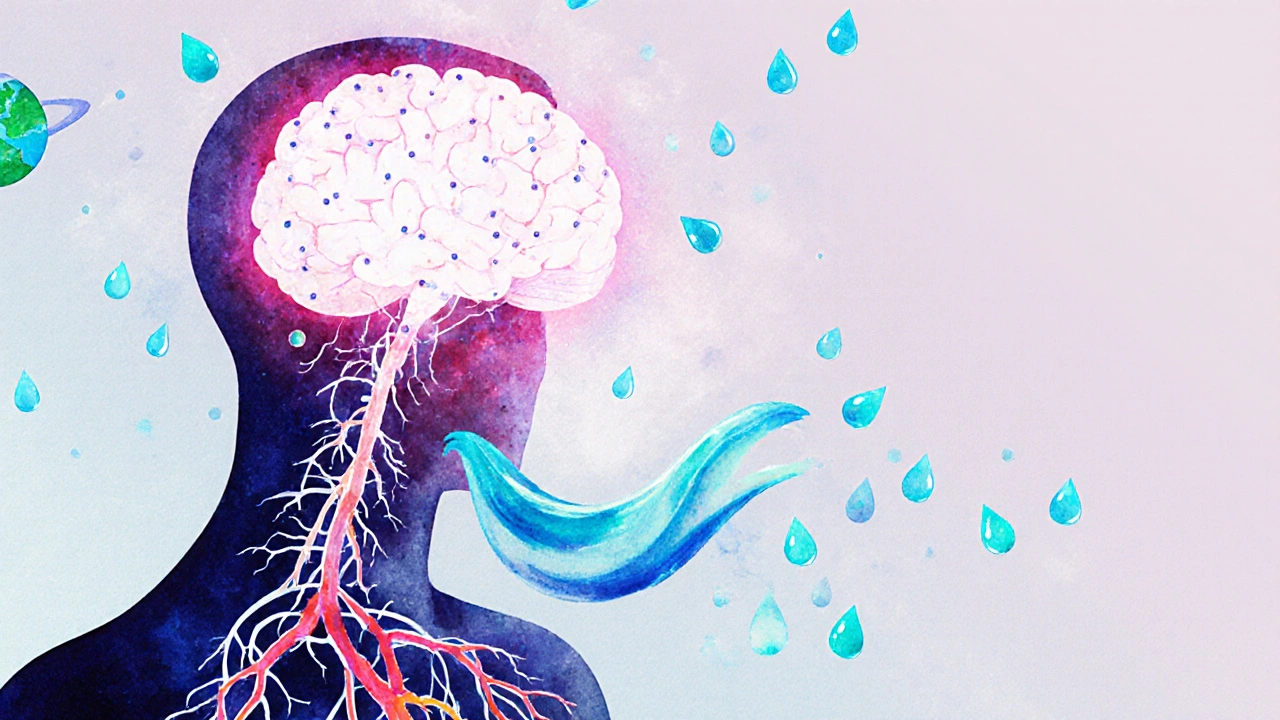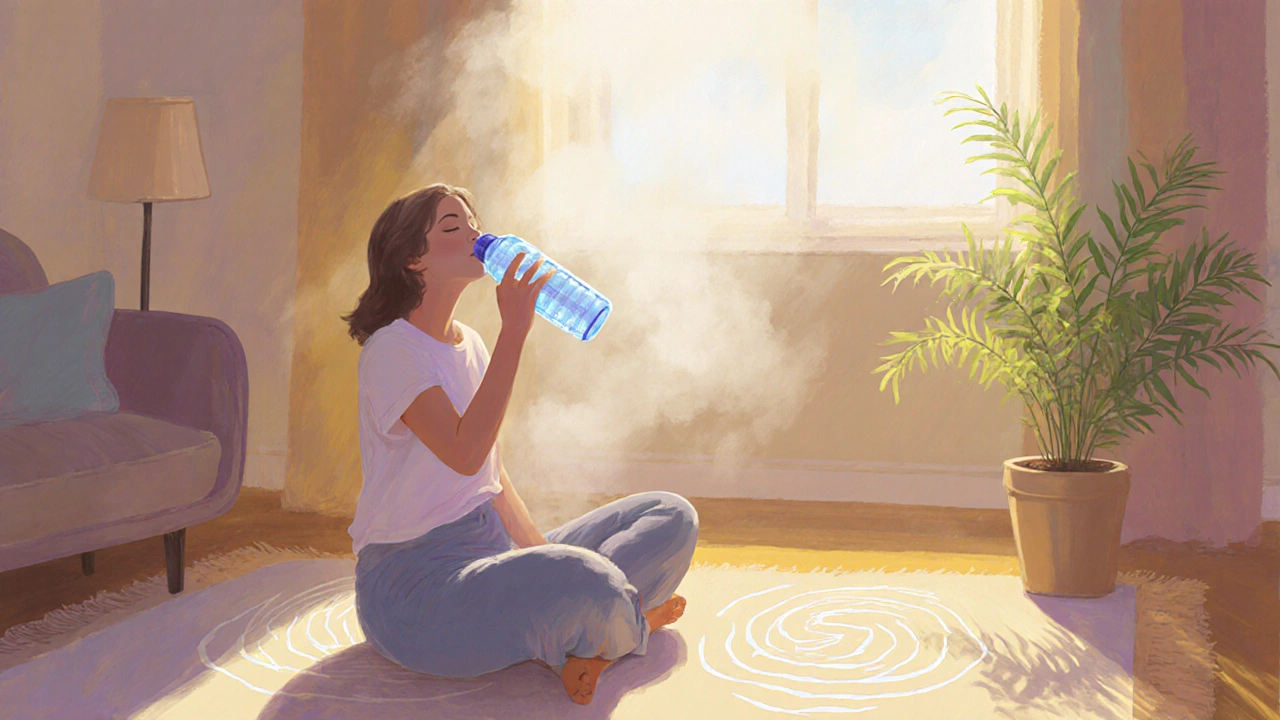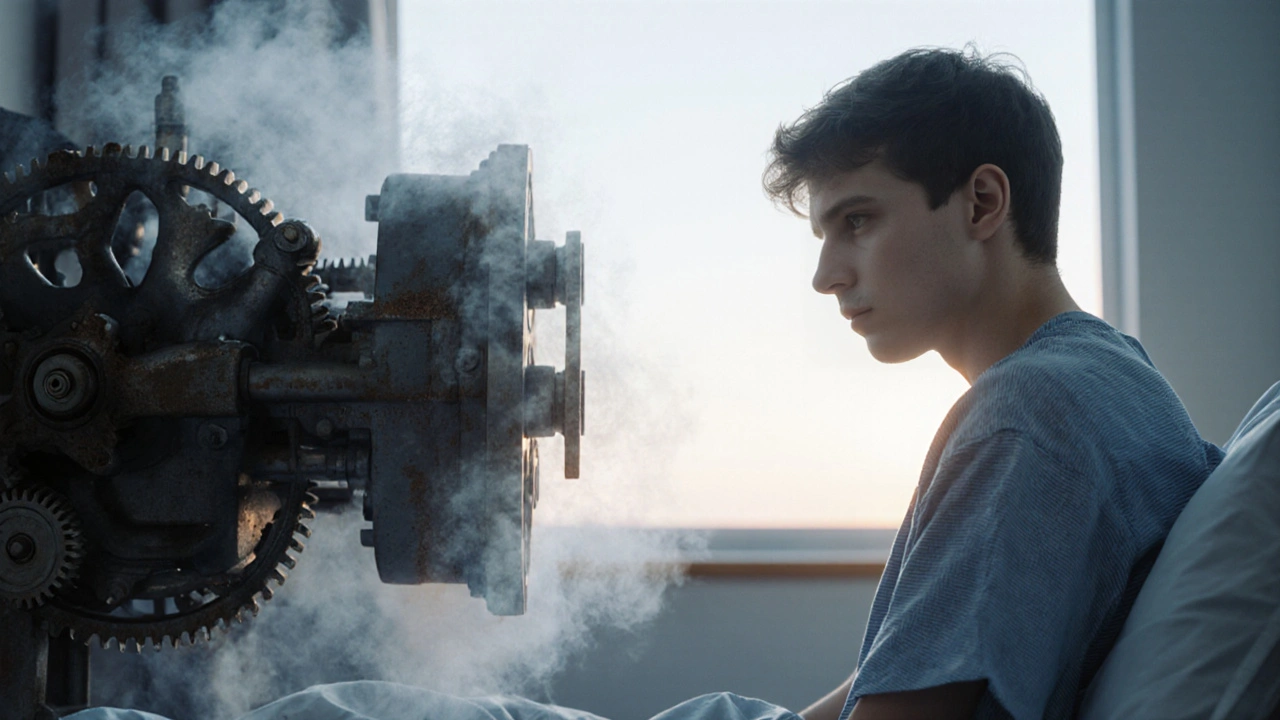Ever notice your mouth getting dry when you’re worried about a deadline or an upcoming presentation? That’s not just nerves - it’s Stress‑induced thirst is the sensation of needing to drink water that arises from psychological stress rather than a lack of fluids. When anxiety and stress fire up your nervous system, they can throw off the normal signals that tell your body when it really needs water.
Quick Take
- Stress hormones like cortisol and adrenaline can shrink saliva production, making you feel thirsty.
- Psychological tension often mimics the body’s dehydration signals, leading to extra water intake.
- Hydrating smartly (water, electrolytes, mindful sipping) helps calm both mind and body.
- Persistent, extreme thirst could signal a medical issue - don’t ignore it.
How Anxiety & Stress Trigger Thirst
When you’re anxious, your brain activates the sympathetic nervous system is the part of the autonomic nervous system that prepares the body for ‘fight‑or‑flight’ responses. This releases adrenaline is a hormone that increases heart rate, blood flow to muscles, and alertness and spikes cortisol is a glucocorticoid hormone that helps regulate metabolism and the stress response. Both hormones cause your body to redirect blood to essential organs, pulling it away from salivary glands. The result? A dry mouth, also called xerostomia is the medical term for reduced saliva production leading to a feeling of dryness.
Dry mouth tricks your brain into thinking you’re dehydrated, so you reach for a glass. It’s a classic case of the mind misreading bodily cues.
Physiological Pathways Behind the Thirst
Three main mechanisms connect stress to increased fluid cravings:
- Hormonal shift: Cortisol pushes the kidneys to retain sodium, which pulls water into the bloodstream. The extra fluid can feel uncomfortable, prompting you to drink more.
- Reduced saliva: As mentioned, adrenaline narrows blood flow to the glands, creating that parched feeling.
- Antidiuretic hormone (ADH) fluctuation: Under acute stress, the body sometimes releases more ADH, which tells the kidneys to hold onto water. When the stress eases, ADH drops, leading to a quick surge of urine and the illusion that you need to re‑hydrate.
These processes are normal, but when stress becomes chronic, the signals stay skewed, and you may end up drinking more water than you truly need.
When Thirst Is More Than Stress
It’s easy to blame everything on anxiety, but some red flags suggest a medical cause:
- Constantly feeling thirsty despite drinking several liters a day.
- Frequent urination, especially at night.
- Unexplained weight loss, fatigue, or blurry vision.
These symptoms could indicate diabetes, hypercalcemia, or a thyroid issue. If they persist, schedule a check‑up.

Practical Hydration Tips for Anxious Minds
Staying hydrated doesn’t have to be a chore. Here’s a stress and hydration friendly routine:
- Carry a reusable bottle marked with time intervals (e.g., 8oz every hour). Small sips keep your mouth moist without overloading your system.
- Choose water infused with a pinch of sea salt or a splash of fruit. It adds electrolytes, which balance the sodium‑cortisol interaction.
- Practice mindful drinking is a technique where you pause, notice the taste, and breathe before swallowing. This can reduce the automatic “drink‑first‑thought” response.
- Chew sugar‑free gum or suck on a lozenge when you feel a dry mouth coming on. It stimulates saliva without adding calories.
Lifestyle Adjustments to Reduce Stress‑Induced Thirst
Address the root cause - the stress itself - to calm the thirst cycle.
- Regular movement: Even a 10‑minute walk lowers cortisol levels by up to 20% (study from University of Georgia, 2023).
- Sleep hygiene: 7-9 hours of quality sleep stabilizes hormone production, reducing night‑time ADH spikes.
- Breathing exercises: Box breathing (4‑4‑4‑4) can quickly shift the nervous system back to a parasympathetic state, easing dry‑mouth sensations.
- Limit caffeine & alcohol: Both act as diuretics, compounding the false thirst signal.
Comparison: Stress‑Induced Thirst vs. Medical Causes
| Aspect | Stress‑Induced Thirst | Medical Condition (e.g., Diabetes) |
|---|---|---|
| Onset | Sudden, linked to anxiety spikes | Gradual, often unnoticed at first |
| Urine output | Normal or slightly increased after stress relief | Consistently high, polyuria |
| Blood markers | Typically normal | Elevated glucose, HbA1c |
| Associated symptoms | Dry mouth, tension, racing thoughts | Weight loss, fatigue, blurred vision |
| Response to hydration | Immediate relief after sip | Persistent thirst despite drinking |
When to Seek Professional Help
If you tick more than one of the red‑flag items listed above, make an appointment with your primary care physician. Ask for basic labs: fasting glucose, electrolyte panel, and thyroid function. These tests rule out systemic causes and let you focus on stress‑management strategies.

Frequently Asked Questions
Can drinking too much water make anxiety worse?
Yes. Over‑hydrating stretches the stomach and can trigger a subtle panic response, especially if you feel bloated. Aim for steady, moderate sips instead of gulping large volumes.
Why does my mouth feel dry even after I drink water?
Stress suppresses saliva flow. The water you drink hydrates your bloodstream but doesn’t instantly restore saliva. Chewing sugar‑free gum or using a saliva‑stimulating lozenge can help bridge that gap.
Is caffeine a trigger for stress‑related thirst?
Caffeine is a mild diuretic and also raises cortisol levels, so it can amplify both dehydration and anxiety. Limiting intake to one cup a day can reduce those combined effects.
How much water should I drink if I’m constantly stressed?
The classic “8×8‑ounce glasses” rule is a good baseline, but listen to your body. If you notice dry mouth during a stressful episode, sip 8oz over the next hour, then reassess. Adding electrolytes once a day helps balance the cortisol‑sodium link.
Can mindfulness reduce stress‑induced thirst?
Absolutely. Practices like deep‑breathing or short meditation activate the parasympathetic nervous system, lowering adrenaline and cortisol. Many people report fewer dry‑mouth episodes after a consistent mindfulness routine.








kathy v
September 28, 2025 AT 14:21When the pressure of deadlines stacks up, the American spirit demands both mental toughness and proper hydration, so it’s no coincidence that stress spikes our thirst. The fight‑or‑flight response floods the body with adrenaline, shrinking saliva flow and sending false dehydration signals straight to the brain. Cortisol then tells the kidneys to hold onto sodium, which drags water into the bloodstream, creating that uncomfortable fullness we mistake for needing more water. Meanwhile, the sympathetic nervous system steals blood from the salivary glands, leaving the mouth parched and the mind convinced it’s dehydrated. This cascade repeats every time a high‑stakes project lands on our desk, reinforcing the habit of reaching for the bottle before the stress even subsides. Over time, the habit becomes a loop: anxiety triggers thirst, the sip provides temporary relief, and the brain learns to associate a drink with stress relief. If you break the loop by sipping mindfully instead of gulping, you’ll notice the anxiety dip without the extra water load. Hydration strategies like adding a pinch of sea salt or a splash of citrus not only replenish electrolytes but also blunt the cortisol‑sodium connection that drives excess thirst. Regular movement, even a short walk, can cut cortisol levels by up to twenty percent, making the dry‑mouth episodes far less frequent. Sleep hygiene is another non‑negotiable; seven to nine hours of quality rest stabilizes hormone production and prevents nighttime ADH spikes that can cause nocturnal urination and a fresh morning thirst. Breathing exercises such as box breathing shift the nervous system back to parasympathetic mode, alleviating the dry‑mouth feeling instantly. Chewing sugar‑free gum is a clever hack because it stimulates saliva without adding calories, tackling the root cause of the dry sensation. Remember, persistent, unquenchable thirst could be a sign of something more serious like diabetes, so don’t ignore red flags. In the grand scheme, mastering stress‑induced thirst is about understanding the body’s signal hierarchy and not letting anxiety hijack it. By combining mindful sipping, electrolyte balance, movement, and proper sleep, you reclaim control over both mind and hydration. This is the American way: face the stress head‑on, stay informed, and stay hydrated.
Jorge Hernandez
October 7, 2025 AT 20:34Got it 🙌 short sips beat big gulps any day 😅
Raina Purnama
October 17, 2025 AT 02:47Adding a little bit of honey to your water can soothe a dry mouth while giving a mild energy boost, especially during those long study sessions.
April Yslava
October 26, 2025 AT 08:01People forget that the government really wants us to stay hydrated because a well‑hydrated populace is a productive one, yet they hide the simple tricks behind layers of jargon. The moment you realize that stress‑driven thirst is a manipulation, you can start to push back by using plain water and avoiding those flavored “enhanced” drinks that are just a marketing ploy. Also, do not trust the mainstream advice that tells you to drink endless glasses; listen to your body, not the hype.
Daryl Foran
November 4, 2025 AT 14:14Honestly, I think most of this so‑called stress‑thirst is just an excuse people use to justify drinking more soda. If you cut the caffeine you’ll see the problem disappear.
Rebecca Bissett
November 13, 2025 AT 20:27Wow, what a thorough breakdown!, you really covered hormones, kidneys, and even the role of saliva, - all in one post, great job,; keep it up!!!
Michael Dion
November 23, 2025 AT 02:41Stress makes you thirsty.
Trina Smith
December 2, 2025 AT 08:54💭 Mindful sipping can calm the mind and the mouth at the same time.
josh Furley
December 11, 2025 AT 15:07From a systems‑dynamics perspective, the feedback loop between HPA‑axis activation and osmotic balance creates a classic positive reinforcement pattern; when the loop is unchecked, ‘stress‑induced polydipsia’ emerges as a maladaptive phenotype.
Jacob Smith
December 20, 2025 AT 21:21Yo, that’s solid info! Just remember to keep your bottle handy and take a breather when the work pile looks endless – you’ll stay chill and hydrated.
Chris Atchot
December 30, 2025 AT 03:34Excellent post; however, note that several sentences lack proper commas, e.g., "Stress hormones like cortisol and adrenaline can shrink saliva production" should be "Stress hormones, like cortisol and adrenaline, can shrink saliva production." Also, "dry‑mouth" is better hyphenated as "dry‑mouth."